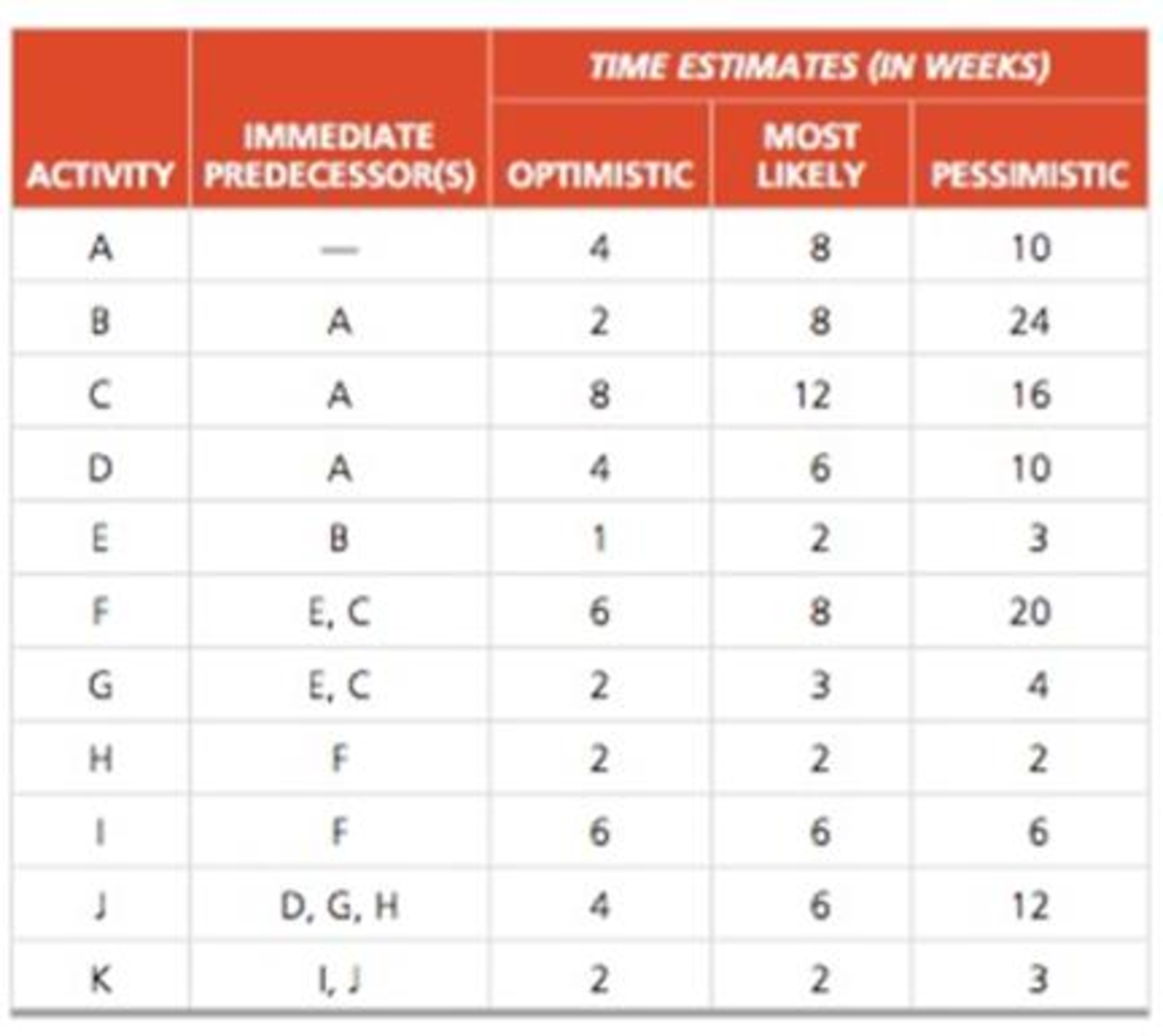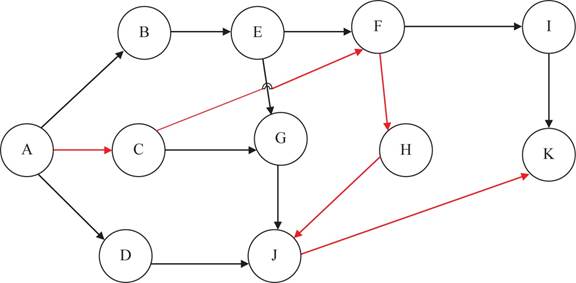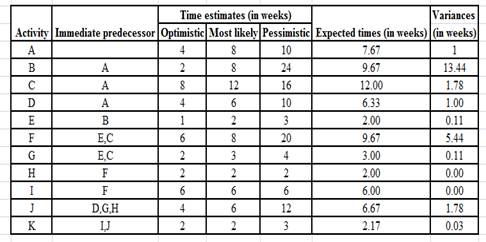
Concept explainers
Ross Hopkins, president of Hopkins Hospitality, has developed the tasks, durations, and predecessor relationships in the following table for building new motels. Draw the AON network and answer the questions that follow.

a) What is the expected (estimated) time for activity C?
b) What is the variance for activity C?
c) Based on the calculation of estimated times, what is the critical path?
d) What is the estimated time of the critical path?
e) What is the activity variance along the critical path?
f) What is the probability of completion of the project before week 36?
a)
To determine: The expected time for activity C.
Introduction: In the activity on nodes (AON) project network diagram, the nodes denote activities and the arrows show only the precedence and succession sequence.
Answer to Problem 17P
The expected time for activity C is 12 weeks.
Explanation of Solution
Given information:
| Activity | Immediate predecessor | Time estimates | ||
| Optimistic | Most likely | Pessimistic | ||
| A | 4 | 8 | 10 | |
| B | A | 2 | 8 | 24 |
| C | A | 8 | 12 | 16 |
| D | A | 4 | 6 | 10 |
| E | B | 1 | 2 | 3 |
| F | E,C | 6 | 8 | 20 |
| G | E,C | 2 | 3 | 4 |
| H | F | 2 | 2 | 2 |
| I | F | 6 | 6 | 6 |
| J | D,G,H | 4 | 6 | 12 |
| K | I,J | 2 | 2 | 3 |
Calculation of expected time for activity C:
AON project network diagram shown below, given the precedence relationships of various activities,

Figure 1
With the given predecessor AON diagram is constructed. To Calculate the expected time for activity C given the data that the optimistic time estimate “a” of activity C of 8 weeks, the most likely time estimate “m” of 12 weeks and the pessimistic time estimate “b” of 16 weeks using the formula.
Where ‘a’ is the optimistic time estimate, ‘m’ is the most likely time estimate and ‘b’ is the pessimistic time estimate
Substitute into the equation (1), the values of
Therefore the expected time for activity C is calcualted by adding 8, 48 and16 and dividing the sum with 6 which gives
Hence, the expected time for activity C is 12 weeks.
b)
To calculate: The variance for activity C.
Answer to Problem 17P
The variance for activity C is 1.78 weeks.
Explanation of Solution
Given information:
| Activity | Immediate predecessor | Time estimates | ||
| Optimistic | Most likely | Pessimistic | ||
| A | 4 | 8 | 10 | |
| B | A | 2 | 8 | 24 |
| C | A | 8 | 12 | 16 |
| D | A | 4 | 6 | 10 |
| E | B | 1 | 2 | 3 |
| F | E,C | 6 | 8 | 20 |
| G | E,C | 2 | 3 | 4 |
| H | F | 2 | 2 | 2 |
| I | F | 6 | 6 | 6 |
| J | D,G,H | 4 | 6 | 12 |
| K | I,J | 2 | 2 | 3 |
Calculation of variance for activity C:
Calculate the variance for activity C using the formula
Substitute in equation (2) the values of
The variance of activity C is calculated by squaring the value obtained by dividing the difference of 16 and 8 with 6 which gives the resultant as 1.28 weeks.
The variance in activity C is 1.78 weeks.
c)
To determine: The critical path.
Answer to Problem 17P
The critical path AàCàFàHàJàK.
Explanation of Solution
Given information:
| Activity | Immediate predecessor | Time estimates | ||
| Optimistic | Most likely | Pessimistic | ||
| A | 4 | 8 | 10 | |
| B | A | 2 | 8 | 24 |
| C | A | 8 | 12 | 16 |
| D | A | 4 | 6 | 10 |
| E | B | 1 | 2 | 3 |
| F | E,C | 6 | 8 | 20 |
| G | E,C | 2 | 3 | 4 |
| H | F | 2 | 2 | 2 |
| I | F | 6 | 6 | 6 |
| J | D,G,H | 4 | 6 | 12 |
| K | I,J | 2 | 2 | 3 |
Calculation of critical path:
Using equation (1) and (2)calculate the expected times and variances for all the activitiesand obtain the values shown in table.

Figure 1, shows the AON diagram which gives the critical path. The critical path is AàCàFàHàJàK.
Hence, the critical path AàCàFàHàJàK.
d)
To Compute: The estimated time of the critical path.
Answer to Problem 17P
The critical path AàCàFàHàJàK which is 40.18 weeks.
Explanation of Solution
Given information:
| Activity | Immediate predecessor | Time estimates | ||
| Optimistic | Most likely | Pessimistic | ||
| A | 4 | 8 | 10 | |
| B | A | 2 | 8 | 24 |
| C | A | 8 | 12 | 16 |
| D | A | 4 | 6 | 10 |
| E | B | 1 | 2 | 3 |
| F | E,C | 6 | 8 | 20 |
| G | E,C | 2 | 3 | 4 |
| H | F | 2 | 2 | 2 |
| I | F | 6 | 6 | 6 |
| J | D,G,H | 4 | 6 | 12 |
| K | I,J | 2 | 2 | 3 |
Calculation of estimated time of the critical path:
Figure 1, shows the AON diagram which gives the critical path. The critical path is AàCàFàHàJàK.
The various paths and the expected completion times are listed in the table
| Various paths | Completion times |
| AàBàEàFàIàK | 37.18 weeks |
| AàBàEàGàJàK | 31.18 weeks |
| AàCàFàHàJàK | 40.18 weeks |
| AàCàGàJàK | 31.51 weeks |
| AàDàJàK | 22.84 weeks |
Hence, the estimated time of the critical path AàCàFàHàJàK is 40.18 weeks.
e)
To determine: The variance of the critical path.
Answer to Problem 17P
The variance of the critical path is 10.03 weeks.
Explanation of Solution
Given information:
| Activity | Immediate predecessor | Time estimates | ||
| Optimistic | Most likely | Pessimistic | ||
| A | 4 | 8 | 10 | |
| B | A | 2 | 8 | 24 |
| C | A | 8 | 12 | 16 |
| D | A | 4 | 6 | 10 |
| E | B | 1 | 2 | 3 |
| F | E,C | 6 | 8 | 20 |
| G | E,C | 2 | 3 | 4 |
| H | F | 2 | 2 | 2 |
| I | F | 6 | 6 | 6 |
| J | D,G,H | 4 | 6 | 12 |
| K | I,J | 2 | 2 | 3 |
Calculation of variance of the critical path:
The activity variance σ2along the critical path AàCàFàHàJàK is the sum of the variances of individual activities A, C, F, H, J and K.
Therefore,
The activity variance along the critical path is the sum of 1, 1.78, 5.44, 0, 1.78, 0.03 is 10.03 weeks.
Hence, the variance of the critical path is 10.03 weeks
f)
To compute: The probability of completion of the project before week 36 weeks.
Answer to Problem 17P
The probability of completion of the project before week 36 weeks is 9.34%.
Explanation of Solution
Given information:
| Activity | Immediate predecessor | Time estimates | ||
| Optimistic | Most likely | Pessimistic | ||
| A | 4 | 8 | 10 | |
| B | A | 2 | 8 | 24 |
| C | A | 8 | 12 | 16 |
| D | A | 4 | 6 | 10 |
| E | B | 1 | 2 | 3 |
| F | E,C | 6 | 8 | 20 |
| G | E,C | 2 | 3 | 4 |
| H | F | 2 | 2 | 2 |
| I | F | 6 | 6 | 6 |
| J | D,G,H | 4 | 6 | 12 |
| K | I,J | 2 | 2 | 3 |
Calculation of probability of completion of the project before week 36 weeks:
Use the normal distribution tables given that the estimated mean time is 40.18 weeks and the standard deviation is square root of 10.03 weeks.
First compute the standard deviation σ by computing the square root of 10.03 weeks.
Calculate the z value as shown below
For a z value of -1.32, the probability is 9.34%.
Therefore, there is a probability of 9.34% that the project may be completed on or before 36 weeks.
Hence, the probability of completion of the project before week 36 weeks is 9.34%.
Want to see more full solutions like this?
Chapter 3 Solutions
Principles Of Operations Management
- How would you design and implement a modern networking solution for JAMS Manufacturing to connect all their facilities and ensure seamless communication? The company currently has standalone systems in three manufacturing plants and an office building, each using its own modem or router for internet access. The goal is to create private networks for each location, connect them to one another, and provide Internet access to all. You’ll need to consider factors like new computer systems, servers, and telecommunications wiring, and explain how your solution will benefit the company and how it will be implemented effectively.arrow_forwardIdentify specific performance management processes covered in this course and how each aligns with an elements of LaFevor’s HCMS Model.arrow_forwardIdentify specific performance management processes covered in this course and how each aligns with LaFevor’s HCMS Model. LaFevor, K. (2017). What’s in Your Human Capital Management Strategy? The Game Plan, the Path, and Achievingarrow_forward
- assess how Human Capital Management Strategy is aimed at building an effective integrated performance management system: Discuss how human capital management strategy relates to performance management.arrow_forwardCASE STUDY 9-1 Was Robert Eaton a Good Performance Management Leader? R obert Eaton was CEO and chairman of Chrys- ler from 1993 to 1998, replacing Lee Iacocca, who retired after serving in this capacity since 1978. Eaton then served as cochairman of the newly merged DaimlerChrysler organization from 1998 to 2000. In fact, Eaton was responsible for the sale of Chrysler Corporation to Daimler-Benz, thereby creating DaimlerChrysler. With 362,100 employees, DaimlerChrysler had achieved revenues of €136.4 billion in 2003. DaimlerChrysler's passenger car brands included Maybach, Mercedes-Benz, Chrysler, Jeep, Dodge, and Smart. Commercial vehicle brands included Mercedes-Benz, Freightliner, Sterling, Western Star, and Setra. From the beginning of his tenure as CEO, Eaton communicated with the people under him. He immediately shared his plans for the future with his top four executives, and upon the advice of his colleague, Bob Lutz, decided to look around the company before making any hasty…arrow_forwardCritically assess Martin’s coaching style.arrow_forward
- Compare Robert Eaton’s performance management leadership presented in the case against the performance management leadership principles, functions, and behaviors. What recommendations can be made about what he might do more effectively? Explain and defend your answer.arrow_forwardIn the context of the material in Chapter 9, provide a critical analysis of the decisions that Henry has made in assigning Martin to this role.arrow_forwardpanies (pp. 80-118). New York, NY: Times Books, specifically Chap. 4, "Robert Eaton and Robert Lutz; The Copilots." CASE STUDY 9-2 Performance Management Leadership at Henry's Commercial Sales and Leasing H enry is the owner of a small real estate agency that handles the sale and leasing of commercial property. He has two real estate agents working in the office, along with himself. He also has two customer service representatives (CSRs), each of whom has a real estate license, and one receptionist who has worked for the company for about three months. Henry has recently decided that he needs another customer service representative. He hasarrow_forward
- Discuss possible solutions to help Tara become an effective CSR. What should martin be doing to help her?arrow_forwardWhat are the ethical challenges regarding employees (i.e., diversity, discrimination, sexual harassment, privacy, employee theft, bad leadership, etc.) that Apple Inc. has faced over the past five to ten years and that they should prepare to face in the next five to ten years. Once a developed list of challenges is created, consider how having faced those challenges will impact and be impacted by the social cause you've selected. Propose the findings on the ethical challenges faced by Apple Inc. in recent history and the near future. Analyze ways in which each challenge was (and/or could be) appropriately handled and areas for improvement. Evaluate the ethical/moral aspects of Apple Inc. that protected it from ethical challenges in the past and could protect it in the future. Assess how ethical challenges and handling of ethical challenges could positively or negatively impact the charitable cause are selected and how the selection of your social cause could positively or negatively…arrow_forwardBy selecting Cigna Accredo pharmacy that i identify in my resand compare the current feedback system against the “Characteristics of a Good Multiple Source Feedback Systems” described in section 8-3-3. What can be improved? As a consultant, what recommendations would you make?arrow_forward
 Practical Management ScienceOperations ManagementISBN:9781337406659Author:WINSTON, Wayne L.Publisher:Cengage,
Practical Management ScienceOperations ManagementISBN:9781337406659Author:WINSTON, Wayne L.Publisher:Cengage, Purchasing and Supply Chain ManagementOperations ManagementISBN:9781285869681Author:Robert M. Monczka, Robert B. Handfield, Larry C. Giunipero, James L. PattersonPublisher:Cengage Learning
Purchasing and Supply Chain ManagementOperations ManagementISBN:9781285869681Author:Robert M. Monczka, Robert B. Handfield, Larry C. Giunipero, James L. PattersonPublisher:Cengage Learning



